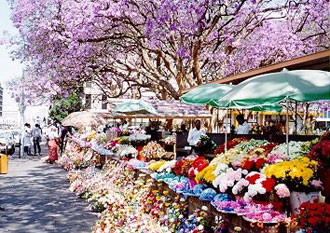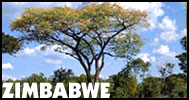Zimbabwe (once called Rhodesia) is almost the definition of a failed state:
Since 2000, Zimbabwe has suffered a catastrophic economic decline. The government-backed seizure of land from white farmers has crippled the commercial farming sector; a default on international loans has cut off the possibility of outside aid; and slum clearances have left 700,000 people homeless. Foreign investment, which had amounted to $436 million in 1998, has almost entirely ceased. The population of 12.3 million is now 80 percent unemployed and dependant for survival on food donations and remittances from relatives overseas. The economy suffers from hyperinflation, de-industrialisation, and an exodus of the workforce into South Africa and Botswana. Life expectancy has fallen to under 40 years, due to starvation and high rates of malaria, cholera, and HIV. Zimbabwe’s democratic institutions have been severely weakened by the ruling ZANU-PF party. Corruption is widespread, elections are marked by fraud and intimidation, and political opponents are frequently killed or tortured.Hardly a day goes by without some appalling news coming from that miserable land run by a world-class psychopath, Robert Mugabe, who took power in 1980 and forgot to give it back. Even self-appointed saints working for the Wretched of the Earth, who blame any less-than-utopian conditions on "the legacy of Western imperialism," can't quite bring themselves to argue that life in Zimbabwe, liberated from colonial and white rule, is better than it was in the old Rhodesia. (So, of course, they just avoid the question.)
Curious to know if Zimbabwe still has any cheerleaders, I checked a few travel Web sites. (I did the same experiment on Iraq, just before the invasion that was obviously coming. There was an official government tourist ministry site, although it didn't go very deep and seemed not to have been updated recently.) No one looks at a place with rosier-colored glasses than a travel promoter.
The web site Afrizim says that Zimbabwe is "known as Africa's Paradise and is a breathtaking country." And it leaves no doubt that Zimbabwe has attractions for sightseers: Victoria Falls, Hwange National Park and Matusadona National Park for wildlife, the Eastern Highlands with their mountains, Lake Kariba ("one of Africa's best kept secrets"), and Masvingo ("the most extensive and best-preserved ruins anywhere in Africa south of the Sahara Desert").
That last description sounds like it might apply to all of Zimbabwe.
So what about, uh, cities like the capital, Harare?
Harare has no absolutely compelling sights but is a pleasant and compact city with a population of more than a million people.According to iExplore, Harare isSet in the natural garden of the Zimbabwe highveld 1 500 metres above sea level, Harare is a city of trees and gardens nurtured by champagne air and a temperate climate.The name 'Harare' means in the Shona language 'the one who does not sleep' and indeed Harare is a city with many stimulating attractions.
… a clean and sophisticated city, characterized by flowering trees, colorful parks and contemporary architecture. Local sightseeing includes the modern museum and art gallery, the Robert McIlwaine Recreational Park, which has a lake and game reserve, the Lion & Cheetah Park, the Larvon Bird Gardens and the landscaped gardens of aloes and cycads at Ewanrigg Botanical Gardens. Due to its pleasant climate, Harare is known as the ‘Sunshine City’.Sure enough, if you search for pictures of Harare on Google Images, you see what looks like an appealing tropical city:

It’s Harare, Zimbabwe’s flower market in Africa Unity Square, a landmark in the city center, busy and beautiful for more than 50 years. Now it’s gone. President Mugabe’s police destroyed the flower market last month as part the dictator’s “Operation Murambatsvina, or Drive Out Trash.” Mugabe and his henchmen call this urban renewal.
The Zimbabwe Independent responded with outrage after the vendors were brutalized and their flowers destroyed May 21.
“There is admittedly much crime and grime that needs to be addressed in the inner city. But the flower sellers in Africa Unity Square were not part of the problem,” said the editorial. It noted that “the burgeoning informal sector is a reflection of (the) government’s failure to nourish and sustain a viable formal sector.” People are surviving through folk economics, because Zimbabwe’s mainline economy has shuttled between non-existence and corruption.
The iExplore site does acknowledge in its overview that "Modern Zimbabwe is in a terrible state," and explains why in some detail. It adds: "It is a shame that the country has gained such a bad reputation as it boasts some amazing natural sites."
Zimbabwe is likely to be inexpensive (once you get there), and you can avoid tourist crowds. If you're considering a holiday there, the state-sponsored tourism web site is www.zimbabwetourism.co.zw and sometimes it loads; you can also get advice on the site about "investment in Zimbabwe." In the United States, the Zimbabwe tourist office is at 128 East 56th Street, New York, NY 10022, (212) 486 3444.


No comments:
Post a Comment